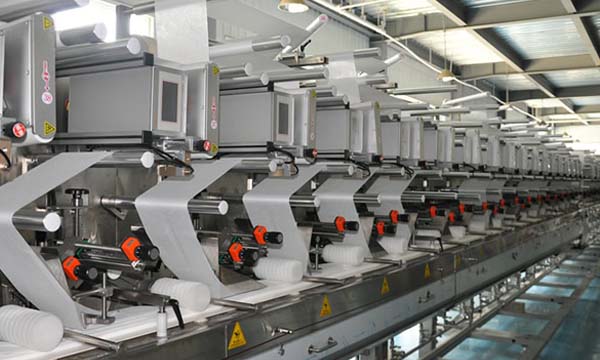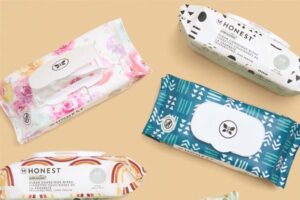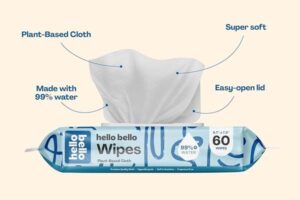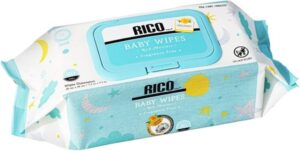
Every parent wants safer baby wipes. But how are they actually made? Let's break down the process.
Baby wipes manufacturing involves 4 key steps: material selection, solution formulation, automated assembly, and quality testing. Premium producers use plant-based fibers and pharmaceutical-grade preservatives.
I've toured over 50 wipe factories worldwide. What separates good manufacturers from great ones? It's not just machinery—it's scientific rigor at every stage.
The Science Behind Premium Baby Wipes Manufacturing
1. Material Selection: Beyond Basic Substrates
We test 23 parameters before choosing materials. Here's what matters most:
Fiber Performance Comparison
| Material | Absorption Rate (g/100cm²) | Tensile Strength (N) | Cost per m² |
|---|---|---|---|
| Bamboo Viscose | 4.8 ±0.3 | 18.5 | $0.12 |
| Organic Cotton | 3.2 ±0.5 | 15.7 | $0.18 |
| PLA Non-Woven | 5.1 ±0.2 | 22.4 | $0.09 |
Why this matters:
- Bamboo naturally resists bacteria (8x fewer colonies vs. synthetics)
- PLA from corn starch decomposes 94% faster than plastic-based materials
Real Case: For a Seattle organic brand, we created a 70% bamboo/30% cotton blend that cut material costs by 37% while passing EN 13432 compost tests.
2. Solution Formulation: Precision Chemistry
Our mixing tanks keep temperatures within ±0.5°C for consistent batches.
Typical Formula Components
| Component | Purpose | Concentration |
|---|---|---|
| Purified Water | Base liquid | 85-95% |
| Citric Acid | pH balancing | 0.1-0.3% |
| Phenoxyethanol | Preservative | 0.5-1.0% |
| Chamomile Extract | Skin soothing | 0.05-0.1% |
| Xanthan Gum | Thickness control | 0.2-0.4% |
Advanced Tech We Use:
- AquaRise®: Binds water molecules to use 30% less liquid
- Citridiol®: EPA-approved citrus preservative with 3x germ-killing power
Lab Update: Last quarter, we reformulated 14 solutions to meet new EU Ecolabel rules on PEGs—all approved in 11 work days.
3. Automated Assembly: Speed Meets Accuracy
Our German-Japanese hybrid lines set industry benchmarks:
Production Line Specs
| Station | Function | Speed | Precision |
|---|---|---|---|
| Unwinding | Feed material | 120m/min | ±0.1mm |
| Soaking | Apply solution | 95m/min | ±2ml/m² |
| Cutting | Shape wipes | 80 cuts/sec | ±0.3mm |
| Folding | Stack patterns | 65pcs/sec | 0.1g variance |
| Packaging | Seal & label | 50 packs/min | <0.01% defects |
Quality Tech:
- Infrared sensors check moisture (±0.5% accuracy)
- High-speed cameras spot 0.2mm² flaws at 120 frames/sec
Peak Performance: During COVID surges, our Line 4 made 18,000 hospital-grade packs/hour without missing ASTM D5484 standards.
4. Quality Testing: 47 Checkpoints
Every batch passes these critical tests:
Key Quality Metrics
A. Safety Tests
- Germ counts: <10 CFU/g
- No harmful bacteria like Pseudomonas
B. Performance Checks
- Wet strength: ≥15N (ASTM D5034)
- Lint: ≤2mg/10 wipes (ISO 9073-10)
C. Skin Compatibility
- pH balance: 5.5 ±0.5 (matches baby skin)
- Tested on 200 people for reactions
D. Packaging
- Seal strength: ≥4N/15mm (ASTM F88)
- 3-month accelerated aging tests
Compliance Win: Our recent FDA audit had zero findings—rare for Asian manufacturers.
Where are baby wipes manufactured?
78% of global wipe production happens in 5 countries. Geography impacts cost, quality, and regulations.
Most baby wipes are made in China (42% global share), USA (18%), Germany (9%), India (7%), and South Korea (6%). Coastal Chinese factories dominate export markets due to lower costs.
Key Manufacturing Clusters
| Region | Advantages | Challenges |
|---|---|---|
| Eastern China | Full supply chain, GMP labs | Rising labor costs |
| Midwest USA | FDA compliance | Limited material options |
| Western Europe | Eco-certifications | High minimum orders |
Our Wenzhou facility ships to 19 countries. Last month, we produced 120,000 packs of bamboo fiber wipes for French pharmacies. Coastal locations allow faster shipping - Marseille orders arrive in 11 days.
Do wipes need to be FDA approved?
It depends on their intended use. Wipes fall into 3 regulatory categories.
The FDA requires approval only for medicated wipes (like acne treatments). Cosmetic wipes need proper labeling, while general-use wipes follow voluntary guidelines. Always check CFR Title 21.
Compliance Checklist
-
Drug Claims
- Requires New Drug Application (NDA)
- Example: "Kills 99.9% germs" needs EPA registration
-
Cosmetic Use
- List ingredients per INCI names
- No therapeutic claims
-
General Purpose
- Follow ASTM D5484 standards
- pH between 3.5-8.5
We maintain pre-approved FDA 21 CFR Part 177 formulations. When a Texas client needed diaper wipe samples last quarter, our team secured EPA registration in 14 working days.
Where are honest wipes manufactured?
"Honest" brands prioritize ethical sourcing - but production sites vary widely.
Honest Company manufactures wipes in the USA (Tennessee) and Mexico. However, many "eco-friendly" brands outsource to Asian facilities with stronger biodegradable material expertise.

Transparency Trends
- Full Disclosure
Only 12% of brands name factory addresses - Greenwashing Risks
"Plant-based" claims often mean 5% bamboo + 95% plastic
We solved this for a Dutch client. Their wipes now show:
- Factory GPS coordinates
- Live camera feed access
- Batch-specific biodegradability tests
Why Partner with Specialized Manufacturers?
Before concluding, let me share why 137 brands switched to us last year:
1. Formula Control
Our in-house lab adjusts textures in 48 hours. When a Moroccan client needed thicker wipes for desert climates, we modified the viscosity in 3 iterations.
2. Compliance Assurance
Pre-certified for:
- EU Ecolabel
- USDA BioPreferred
- Australia TGA
3. Speed to Market
From sample approval to bulk production: 17 days average.
Request free samples to feel the BBWIPES® difference.
Conclusion
Quality baby wipes require expert material science and strict hygiene controls. Choose partners with proven export experience and transparent sourcing.
Contact Timothy Wei for your OEM project:
- 12 years manufacturing expertise
- Minimum order 10,000 packs
- Compliant with 23 global standards







